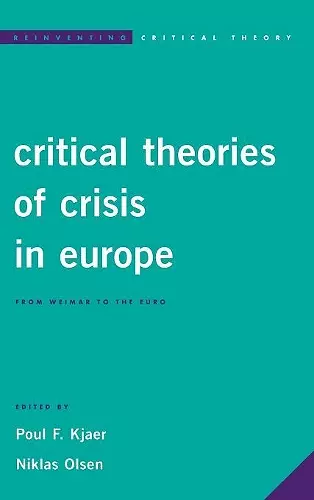Critical Theories of Crisis in Europe
From Weimar to the Euro
Poul F Kjaer editor Niklas Olsen editor
Format:Hardback
Publisher:Bloomsbury Publishing PLC
Published:25th Jul '16
Currently unavailable, and unfortunately no date known when it will be back

What is to be learned from the chaotic downfall of the Weimar Republic and the erosion of European liberal statehood in the interwar period vis-a-vis the ongoing Europeancrisis? This open access book analyses and explains the recurrent emergence of crises in European societies. It asks how previous crises can inform our understanding of the present crisis. The particular perspective advanced is that these crises not only are economic and social crises, but must also be understood as crises of public power, order and authority. In other words, it argues that substantial challenges to the functional and normative setup of democracy and the rule of law were central to the emergence and the unfolding of these crises.
The book draws on and adds to the rich ’crises literature’ developed within the critical theory tradition to outline a conceptual framework for understanding what societal crises are. The central idea is that societal crises represent a discrepancy between the unfolding of social processes and the institutional frameworks that have been established to normatively stabilize such processes. The crises at issue emerged in periods characterized by strong social, economic and technological transformations as well as situations of political upheaval. As such, the crises represented moments where the existing functional and normative grid of society, as embodied in notions of public order and authority, were severely challenged and in many instances undermined. Seen in this perspective, the book reconstructs how crises unfolded, how they were experienced, and what kind of responses the specific crises in question provoked.
The ebook editions of this book are available open access under a CC BY-NC-ND 4.0 licence on bloomsburycollections.com.
Europe today is not Weimar, but Weimar is not as far away as we might believe, is one of several memorable conclusions in this impressive volume which sheds historical light on today’s European crisis. Kjaer and Olsen have gathered and guided an outstanding team which provides deep and new insights on a phenomenon which accompanies modernity since early on. -- Bo Stråth, Professor Emeritus in Nordic, European and World History, University of Helsinki
An important new set of contributions that brings historical and critical depth to the understanding of the current polymorphous yet interlocked European crises. The combination of descriptive and normative approaches, drawn from a variety of disciplinary fields (law, sociology, history and critical theory), provides a unique outlook on the structural problems and contradictions that make up Europe’s overall crisis of public power. A must-read for future studies of the European drama. -- Antoine Vauchez, CNRS Research Professor, Université Paris 1-Sorbonne
This book is interesting for readers who are curious about ‘the current hegemonic order’, in connection with the still ongoing crisis and in relation to the concrete historiographical practice of interdisciplinarity, beyond the dominant and exclusive specialities. * European Review Of History *
ISBN: 9781783487455
Dimensions: 233mm x 160mm x 27mm
Weight: 590g
272 pages